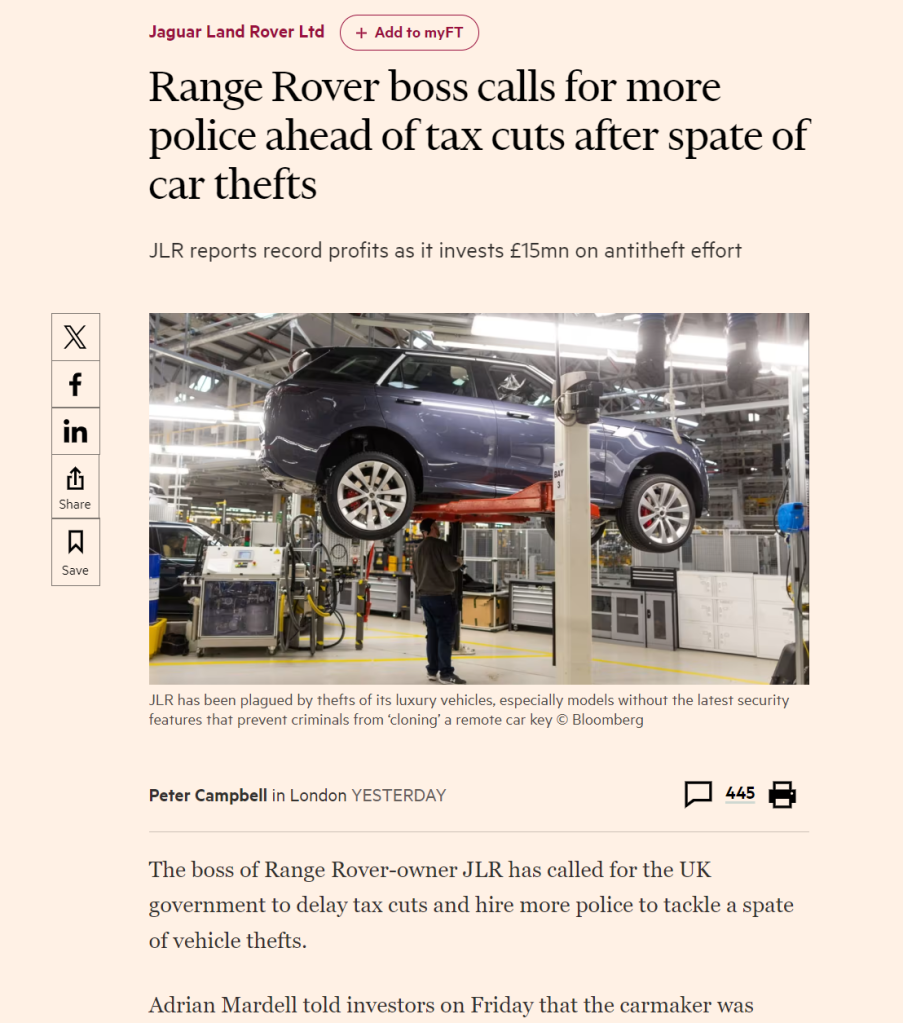A deal with the devil is being made as this blog is written.
The FT has a longform piece on how wealthy donors and business leaders are flocking to the centre left Labour party. Much of this seems to be about backing what is now clearly a winner, rather than some ideological unity. Or is it? In many ways a party that dropped a commitment to wealth taxes is also a party now hugely relaxed about profit as a signal of success and contribution to the economy. It is just a shame that there isn’t more recognition that an economy is also made of people and communities. As we get ready for the promised land, or narrow social vision, of a Labour victory there is much still to consider about how we tackle the question of inequality. Do we ‘need’ a pact with business to assure victory? Does ‘business’ not, in reality, refer to firms that operate as employers who are socially embedded entities as much as some narrowly defined machine for profit? Can we make even modest claims on wealth to fund vital social infrastructure (health, education, policing, social care and so on, and on!) without scaring capital or those who are asset rich?
One of the questions that has been floating around recently relates to whether the very rich will move away if personal and wealth taxation are increased. The critical thing to remember here is that the wealthy are in many was embedded in localities, clubs, with children in (private) schooling, working in office buildings are connecting with business associates, colleagues, friends and family in the social infrastructure of the neighbourhoods they live in. It is not so much that the rich are simply like everyone else, but rather that they are attached to place, emotionally, physically and in terms of the capital investments that they hold. This casts questions of tax contribution in an interesting light because it is the very non-substitutability of cities like London that brings these forms of social and capital investment, and it means that tax rates becomes a much fuzzier question. For the wealthy tax is something to be navigated, avoided, sometimes evaded and ultimately paid as the price of access to the club space that is London.
Just this week we have heard from the developer of One Hyde Park that the smart money is on Dubai. Apparently there is nowhere else like it globally today, everyone is buying-in and the mood is, yes, you’ve guessed it, much as it was when the record setting prices at One Hyde made their debut a decade ago. The smart Marxist geographers will tell you that, on one level, he is right – the bowls of the fountain have filled in London and investors can only make gains in a less ‘developed’ market. But beyond this, credulity quickly ceases. Dubai is one of the least sustainable and, arguably, liveable cities in the world. Almost unending energy is supplied to maintain conditions at a survivable level and private infrastructure projects often feel disconnected. A buck there may be to be made, but the risks are palpable – you are likely to need to take off your shirt to deal with the heat, or lose it in the coming inevitable downturn as investment shuns ecologically fragile locations that are utterly dependant on high carbon footprints to access or to leave.
Despite the devastation wrought by a finance economy and social outfall of a political system that throws continued favours most at those who need them least, London is a great city. It is green, accessible, well served by transport and offers history, culture and experience by turns. What is needed is some modest pluck to advance a basic argument – this and other cities are best when they are fairest. It is not credible to suggest that the rich will leave if they are asked to contribute more. Further, it is not beyond the skills of government to create fair systems of wealth taxation that can operate to produce a more cohesive and better quality public realm which, after all, rich and poor ultimately share. What seems increasingly evident is that it is not the rich themselves that are bleating, but instead those that work for them, invest for them, or who want to associate with them. This party must not risk being ended by silly talk of wealth taxes even if more than half of people believe they are a good idea. In many ways that boat has sailed because it is now Labour’s commitment, though proposals on the ‘non-dom’ system are being pushed ahead with. But at some point the downright brokenness of our housing, public schools, hospitals, social services, prisons, roads, and the need for real investment in a move to a greener economy will force a grown-up conversation.

